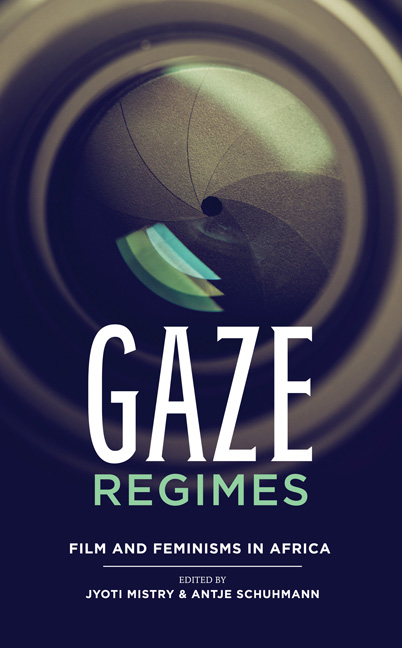Book contents
- Frontmatter
- Contents
- Acknowledgements
- Foreword: Goethe-Institut sub-Saharan Africa
- Introduction: By way of context and content
- 1 African Women in Cinema: An overview
- 2 ‘I am a feminist only in secret’
- 3 Staged Authenticity: Femininity in photography and film
- 4 ‘Power is in your own hands’: Why Jihan El-Tahri does not like movements
- 5 Aftermath – A focus on collective trauma
- 6 Shooting Violence and Trauma: Traversing visual and social topographies in Zanele Muholi's work
- 7 Puk Nini – A Filmic Instruction in Seduction: Exploring class and sexuality in gender relations
- 8 I am Saartjie Baartman
- 9 Filmmaking at the Margins of a Community: On co-producing Elelwani
- 10 On Collective Practice and Collected Reflections
- 11 ‘Cinema of resistance’
- 12 Dark and Personal
- 13 ‘Change? This might mean to shove a few men out’
- 14 Barakat! means Enough!
- 15 ‘Women, use the gaze to change reality’
- 16 Post-colonial Film Collaboration and Festival Politics
- 17 Tsitsi Dangarembga: A manifesto
- Acronyms and Abbreviations
- List of Contributors
- Filmography
- Index
11 - ‘Cinema of resistance’
Published online by Cambridge University Press: 20 April 2018
- Frontmatter
- Contents
- Acknowledgements
- Foreword: Goethe-Institut sub-Saharan Africa
- Introduction: By way of context and content
- 1 African Women in Cinema: An overview
- 2 ‘I am a feminist only in secret’
- 3 Staged Authenticity: Femininity in photography and film
- 4 ‘Power is in your own hands’: Why Jihan El-Tahri does not like movements
- 5 Aftermath – A focus on collective trauma
- 6 Shooting Violence and Trauma: Traversing visual and social topographies in Zanele Muholi's work
- 7 Puk Nini – A Filmic Instruction in Seduction: Exploring class and sexuality in gender relations
- 8 I am Saartjie Baartman
- 9 Filmmaking at the Margins of a Community: On co-producing Elelwani
- 10 On Collective Practice and Collected Reflections
- 11 ‘Cinema of resistance’
- 12 Dark and Personal
- 13 ‘Change? This might mean to shove a few men out’
- 14 Barakat! means Enough!
- 15 ‘Women, use the gaze to change reality’
- 16 Post-colonial Film Collaboration and Festival Politics
- 17 Tsitsi Dangarembga: A manifesto
- Acronyms and Abbreviations
- List of Contributors
- Filmography
- Index
Summary
Kuxa Kanema was the name of the newsreel in Mozambique with which the post-independent government of Samora Machel regained -control over the moving image as a conscious act of decolonisation. The newsreel was screened in cinemas prior to the main film and via mobile cinema units throughout the provinces, which included rural areas. Kuxa Kanema is also the title of a 2003 documentary, directed by Margarida Cardoso, which describes the development of image production from newsreel to documentary and feature film productions to the point of the establishment of the Instituto Nacional de Cinema (INC). In her film Cardoso symbolises the beginning of the new republic in 1975 by lowering the Portuguese flag and by raising the Mozambican flag in its place. This further symbolises the beginning of the imageproduction of the country. Cardoso says in her off-screen commentary in the documentary that she [Cardoso] was aware that President Machel was conscious of the power of the image. It was with Cardoso's film that we opened the second African film festival, Cinemameu, in 2011 in Inhambane, 500 kilometres north of the capital of Maputo.
Inhambane is a provincial town along Mozambique's coastline, and capital of the province of the same name, a calm place whose cultural attractions lie particularly in the rich legacies of Portuguese architecture. Two examples are buildings by Pancho Guedes: the post office and the university. Among the amenities of Inhambane is the Cinema Tofo, where 35mm films were once screened. Years ago the cinema was turned into a communal hall and the old projectors are now dusty. It was here that the 2011 Cinemameu film festival took place. Over the course of a long weekend, contemporary Mozambican films were shown in combination with winners of FESPACO, the Pan African film festival in Ouagadougou, Burkina Faso.
Cinemameu 2011 was organised by a group of local and international cultural activists; the screenings were digital and entrance was free. As a result, a large number of children were present throughout the festival, sharing the cinema hall with a mix of passionate cinemagoers, development aid workers and passers by. The provincial cultural attache sat through the entire opening evening ignoring the critique articulated by the filmmakers present that the government was neglecting support for filmmaking in general.
- Type
- Chapter
- Information
- Gaze RegimesFilm and feminisms in Africa, pp. 148 - 160Publisher: Wits University PressPrint publication year: 2015



